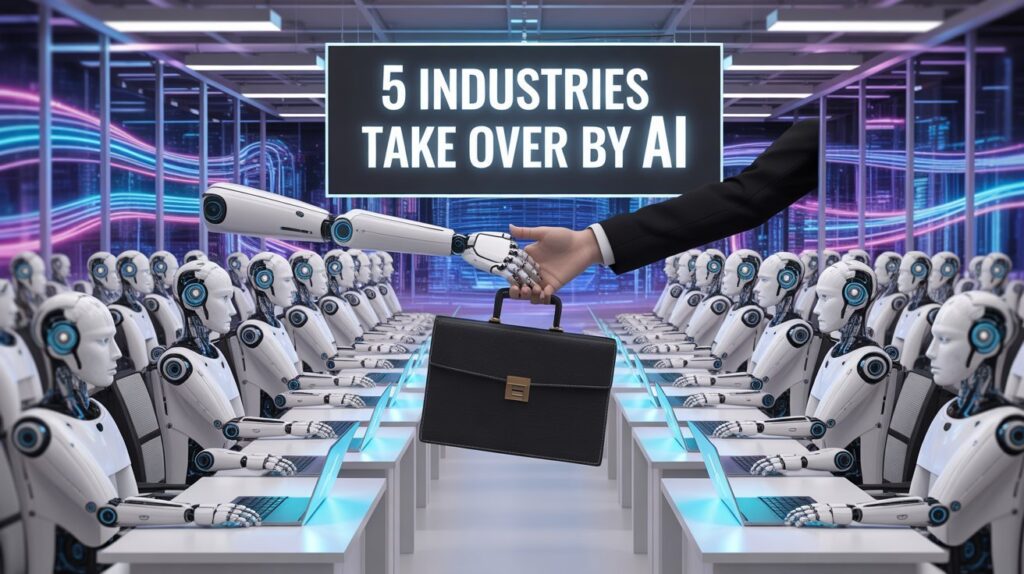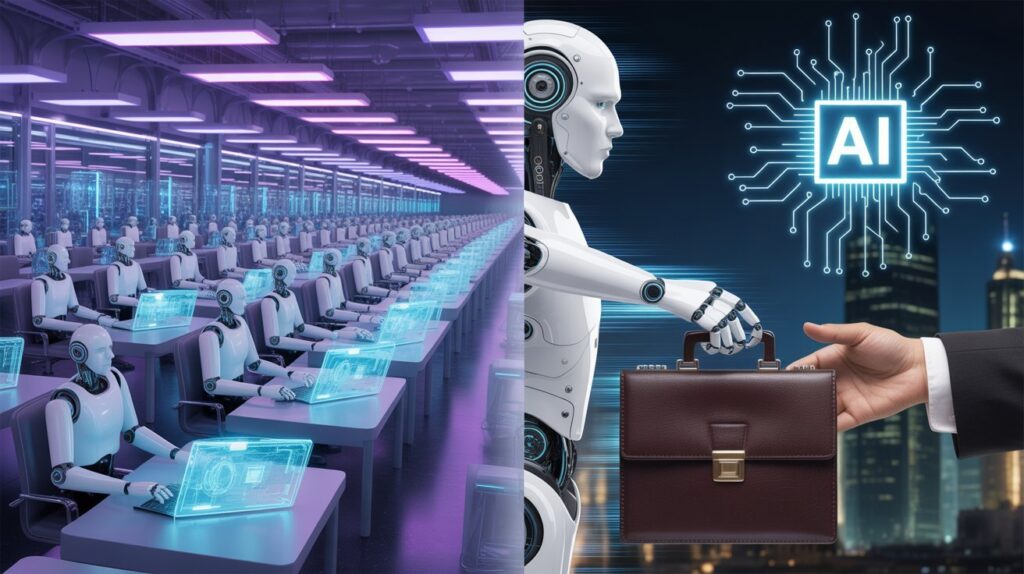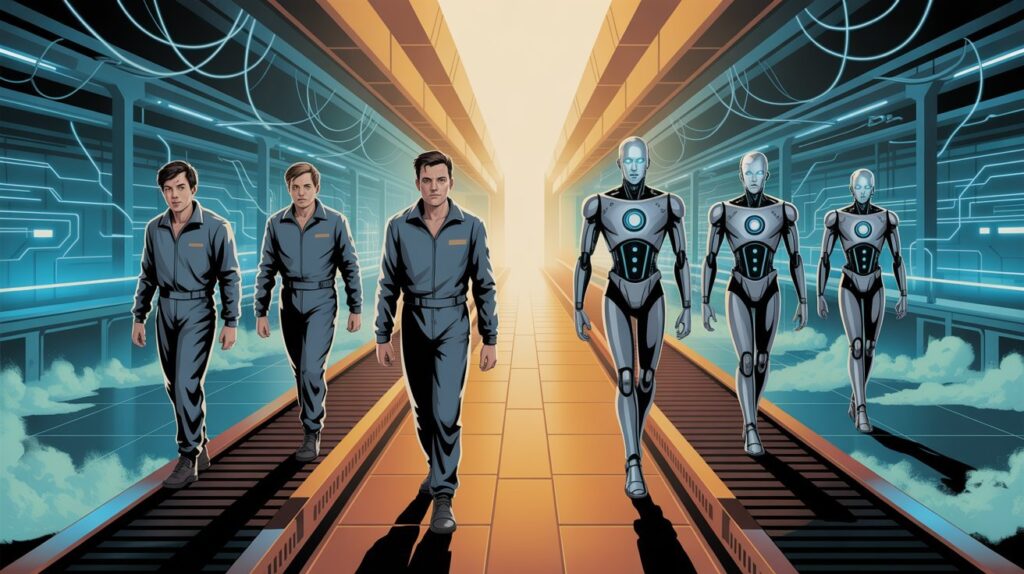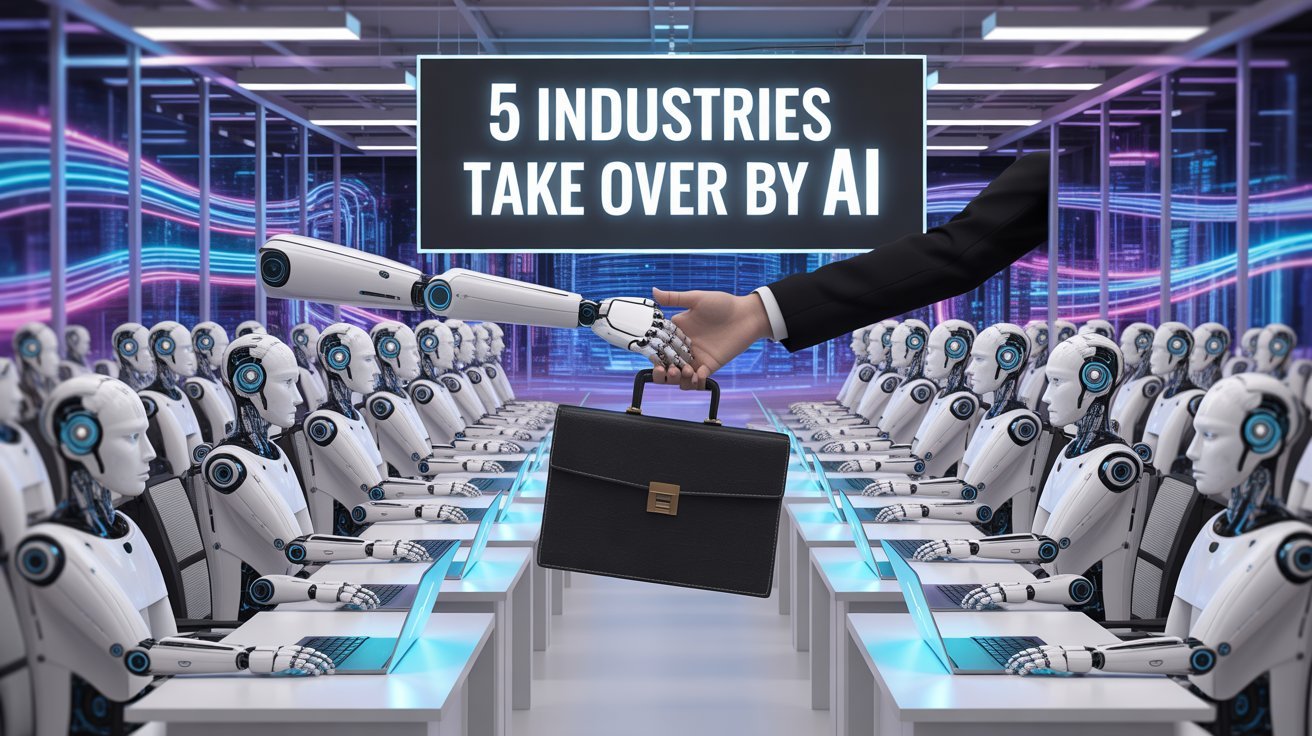I keep hearing people talk about how “AI is the future.” But as I’ve looked at what’s going on across industries, I’ve come to understand something quite different: AI is not the future anymore. It’s the present.
I’ve been keeping an eye on how fast artificial intelligence is infiltrating workplaces in recent months. I’ve talked with experts, reviewed case studies and reports from global companies.
And what I’ve found, and also my really good friend Emly Miller, who I’ve worked with, who’s sort of more on the economics side, told me many things related to the AI trends and future.
According to my research, there are 5 industries AI will completely takeover or heavily disrupt by 2026. If you work in any of these fields, you should already be preparing for a shift because the transition has begun, has quietly started.

What My Research Tells Me?
When I see these industries, one thing is crystal clear to me: AI is not some future threat; we are already living it.
The good news is, this doesn’t mean there’ll be nothing left to do here. What it is saying is that jobs change.
People who upskill into AI-related tools, who focus on strategy, creativity, or human problem-solving, will continue to have opportunities.
Those who follow a repetitive, rule-based routine are going to be the first to be replaced. The companies adopting AI aren’t being “evil.” They’re being efficient. And efficiency doesn’t leave much room for sympathy.
Top Industries AI Will Completely Takeover by 2026
Here are the industries or field that will surely replaced by AI in near future:
1. Legal & Compliance — Where Algorithms Read the Law
I just caught up with a friend from law school, and she’s telling me the scene is so different now. Tasks that were once a rite of passage, like combing through contracts, researching court precedents or validating compliance, are now being automated. AI legal tools are breezing through these duties with surprising ease.
What’s new and trending: On social media, legal forums are abuzz about AI governance platforms, tools that are intended to watch over AI fairness, accountability, and transparency across systems.
By 2028, those using these tools are expected to have 30% more trust and 25% better regulatory compliance.
Why we need to worry: I see legal roles transitioning from more grunt work to overseeing ethical AI, ensuring it works fairly and does not misinterpret laws.
It’s a safe bet that the kid entering law school in 2025 will likely need new skills because the AI is already reading the law.
2. Customer Support & Call Centers — Reimagined by AI

I swear, I hardly ever speak to a person when I call customer service anymore, and I’ve quietly been tracking the AI trend. AI chatbots and virtual agents are doing most of those tasks today.
What’s trending: A Reddit thread on customer experience highlights how AI-powered ticketing systems are now resolving tier 1 issues without a single agent intervention, using customer history, sentiment, and even real-time context.
Why it matters to us: I’ve watched mid-sized companies shutter regional call centers and push bots out overnight. And you don’t have to look far, PwC and other analysts caution that customer-centric job roles in the U.S. could be totally automated by as much as 30% by 2030.
3. Content & Data Work — Creativity Meets Automation
For someone whose life revolves around content creation, the rise of AI as a copywriting partner (or rival) hits close to home. AI can draft articles, social posts, even marketing emails in seconds, prompt some initialisation, and you’re in business.
What’s buzzing online: There’s a wave of “AI slop” videos, automatically generated clips flooding TikTok and YouTube, less guided by narrative and more by shock and algorithms.
Creators without technical skill are even quitting day jobs to show others how to surf this content wave; they call it the “AI video hustle.”
Why it moves me: Once upon a time, creativity was my superpower. Now, with millions of AI-produced words under my belt, I’ve learned to rely on emotional storytelling, nuance and my unique edge, because words aren’t enough.
4. Manufacturing — Robots That Learn and Adapt

I grew up around small factories, so I’ve witnessed the transition from assembly-line speed to robotic precision. But the newest developments go well beyond automation, they’re smarter, more responsive and sometimes even biotechnological.
Emerging innovation spotlight: In China, there’s talk of robotic wombs—devices projected to deliver babies for around $14,000 USD. Yes, it sounds wild, but it signals AI’s reach into biotech, not just machines.
Why it’s on my radar: I’ve watched factories use AI to analyze purity in materials (say, polysilicon production) or train workers with simulated robots. It’s no longer just manual automation; it’s a full-scale redefinition of “manufacturing.”
5. Security Guards & Surveillance — When Machines Watch Instead of Humans
Security roles had been secure until AI drove up with smarter cameras, drones and surveillance systems that never sleep.
Tech that’s turning heads: On international platforms, AI-powered livestream avatars are selling goods like human streamers or better. One brand saw a 30% sales increase after using AI avatars in e-commerce livestreams.
Meanwhile, innovations are also brewing within security: AI now drives wide-area anti-drone systems capable of scanning over 4,000 square kilometers.
Why this sticks with me: If there is a store, it may be protected by drones or edge-AI systems. Offices I go to these days sometimes have autonomous patrol robots or smart cameras with AI watching over every corner of the room, not a guard in sight.
Putting It All Together, What I’m Learning
When you stack up these industries side by side, the picture is clear: AI isn’t optional anymore, it’s essential.
- In legal and compliance, AI can now review contracts, but humans are required to police ethics and governance.
- In customer support, AI takes the routine queries; humans are there for nuance.
- In content, AI blocks the channels, so the value lies in depth, in earnestness, in emotional connection.
- In manufacturing, the future brings biotech and robots that teach; that is, they don’t just work.
- And in security, AI patrols quietly, leaving the human watcher the exception.
What This Means for You & Me
If you work in any of these fields or guide people who do, here is what I am seeing:
- Understand AI as a tool, not a threat. The legal assistant of the future might be an AI, and your job will be to make sure it’s fair and decent.
- Human tasks will get redefined. Customer service will remain, but transformed to empathy-led escalations.
- Creative work needs depth, not volume. In fields crammed with AI-created noise, you will be noticed if you offer insight, nuance and real stories.
- Manufacturing will need human oversight and innovation even more than before but the guard might be digital.
- Security moves from patrol to strategy. If AI is watching, your value might be in the other way; you might interpret or audit those decisions.
Final Thought
This is not some far-off warning; it’s happening to us right now, subtly, silently, all around us. I’ve seen it in forums, in social buzz, in livestream stats and in local factory readings. AI has stretched into nearly every corner of work and life.
So here’s the question I’ve been coming back to, and one that I hope you think about too:
Are you ready to adapt, or are you preparing for the replacement?
Because from where I stand, the AI revolution isn’t on the horizon. It is already here, and learning to surf it is the only way we’re going to stay on board.
